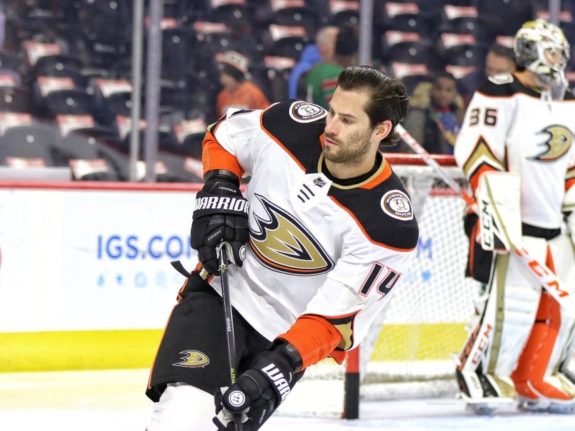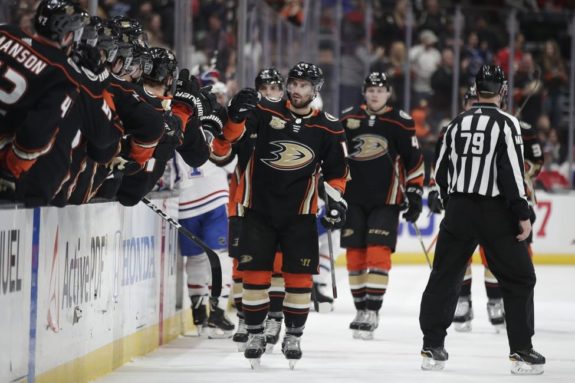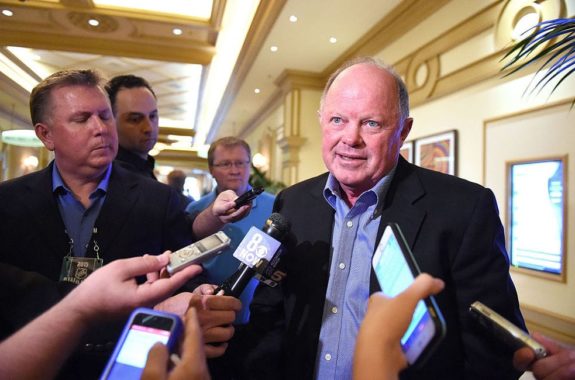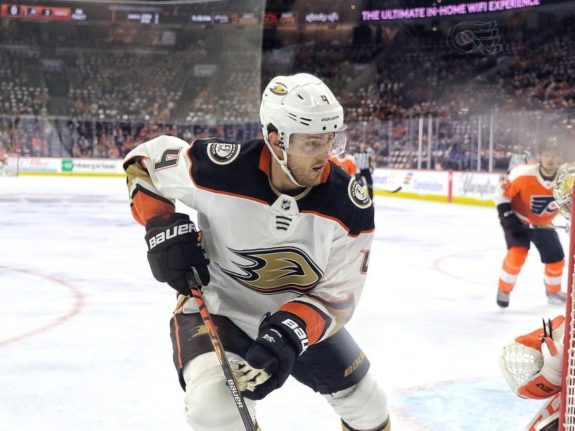Adam Henrique stood out as the Anaheim Ducks’ most valuable player in a mostly dismal season. However, in his recent article for The Athletic, Eric Stephens said Henrique probably isn’t going anywhere but “has some value around the league,” when it comes to a potential trade this season (from ‘Who stays? Who goes? Ducks who could be on the move this offseason’ The Athletic, 8/28/2020).
Related: The NHL’s Top-50 Russians of All-Time
While it might seem ill-advised on the surface, Ducks general manager Bob Murray should capitalize on this value and move on from the team’s top scorer by the upcoming season’s trade deadline. If they don’t, it will cost them a lot to get rid of him when his contract becomes a burden, if they can at all.
Why Trade Henrique Soon?
Why would a team as bad as the Ducks trade their best player? The answer in his long, expensive contract. Henrique is 30 years old now; he will be 34 when his contract expires. Each of those four seasons will come at a $5.82 million cap hit, and the Ducks don’t need to look further than their own roster to find out what can happen when a player’s ability expires before his contract. David Backes and former Duck Corey Perry are both prime examples of that.
Further, coming off one of the best seasons of his career, Henrique is at his peak. Despite a 10-team no-trade clause, Henrique’s reputation as a two-way center with faceoff-winning ability would be valuable to a competitive team at next season’s trade deadline. Maybe just valuable enough for a team to swallow a potentially bad contract.
That term will already diminish the value of assets the Ducks might get in return for him. The fact that they could get anything at all and escape his contract is important considering the alternative, which I will touch on in a moment.

Even more urgent is the fact that his value could diminish very quickly. At Henrique’s age, a bad start to the upcoming season or any sign of age-related decline and his value will suddenly fall far below his contract’s future cost.
Ducks Must Look To the Future
As the Ducks transition from their older veterans to a young crop of players, they will have to keep future expenses in mind. They might not be worth much now, but as they gain NHL experience, Troy Terry, Max Jones, Sam Steel and Max Comtois will all likely demand raises. All four will need new contracts before Henrique’s expires, including Terry, who just signed an extension a couple of months ago. There’s also Danton Heinen and Sonny Milano to consider. Even Trevor Zegras and Brayden Tracey’s entry-level contracts will expire before Henrique’s.
Then there’s Hampus Lindholm and Josh Manson to consider. Both will need new contracts after the 2021-22 season. I’ve listed many players, and it’s impossible to know who might still be around in 2024, but the fact that Henrique’s contract lasts that long is scary enough.
Don’t Try To Use the 2020-21 Expansion Draft
If you’re thinking that the Seattle Kraken expansion draft, slated to take place after the 2020-21 season, would be an opportunity to get out of Henrique’s contract, think again. That option would come at a high cost.
If Henrique experiences a decline in production next season the Ducks would have to give up a lot to get Seattle to select him. In 2017, teams had to trade assets to get Vegas to take players with bad contracts, AND, in some circumstances, had to give up a player in the expansion draft, too.

In 2017, the Tampa Bay Lightning traded their second-round pick in that year’s entry draft, a fourth-round pick they got from the Pittsburgh Penguins for the 2018 draft and Nikita Gusev in exchange for Vegas taking Jason Garrison off their hands.
At the time, Garrison, a 32-year-old defenseman, had played in 70 games for the Lightning, accumulating nine points. He had one more season left on his contract for $4.6 million.
That was the asking price to take on a player whose contract was only going to last another season.
Win Now Versus Win Later Motivation
At that time, the Lightning were in “win now” mode. They had core players like Tyler Johnson and Ondrej Palat to re-sign and needed more cap space to do that and address some needs in free agency. Thus, they were willing to pay a relatively high price to move Garrison’s contract off the books, even with just a season remaining.
The Ducks are rebuilding, so giving up assets to entice the Kraken to take Henrique would be robbing Peter to pay Paul. While Henrique is not likely to continue his production rate as he enters the final part of his career, it’s not worth giving up future assets to escape his contract. And in terms of value for a player, the 2017 Expansion Draft demonstrated that an expansion team’s clean slate relative to the salary cap gives them leverage to pry assets away from other teams to take on a bad contract or two.

Even if Murray has to give up something along with Henrique to send him to another team at or before the trade deadline, he is sure to get an asset in return. That won’t be the case at the expansion draft.
Taking a Chance at the Expansion Draft Without a Trade
The Ducks could dangle Henrique in the expansion draft and use that protection slot to shield a younger, cheaper player. The closest comparison to that situation would be Vegas’ selection of Marc Methot from the Ottawa Senators in 2017.
Methot, a defenseman, turned 32 the day of the expansion draft and had two seasons remaining on his contract at $4.9 million per season. He had 12 assists for a Senators team that made the Eastern Conference Final.
The Golden Knights selected Methot from Ottawa without the Senators having to trade anything to them to do it. Vegas then turned around and traded Methot to Dallas for Dylan Ferguson and a second-round pick at this coming draft.
Methot clearly still had value to another team; the question is, would Henrique? With one year more remaining on his contract at the time he would be selected compared to Methot, Henrique would not be in the same boat. Don’t forget Henrique’s deal is also $1 million more expensive than Methot’s. The odds that Seattle would select him without any prior trade agreement are slim.
Why Not Fowler or Silfverberg?
You might ask yourself why the same argument couldn’t be made for Cam Fowler or Jakob Silfverberg. The answer is easy for Fowler. Though he elevated his play in the 2019-20 season, there is just no way his productivity would justify taking on his contract, which expires after the 2025-26 season and costs Anaheim $6.5 million per year.

The way things are going right now on planet earth, that contract might not expire before the apocalypse. It’s hard to imagine a team that would be willing to take on a contract that Dom Luszczyszyn, hockey math whiz for The Athletic, listed as the No. 7 worst contract in hockey (from ‘By the numbers: A look at the ten worst contracts in hockey’ The Athletic, 7/11/2020).
Silfverberg Is a Front Office Favorite
Silfverberg is on a similar contract to Henrique’s at $5.25 million per year, expiring after the 2023-24 season. Silfverberg is also only eight months younger than Henrique. He’s also a wing, not a centerman and has a more-restrictive no-trade clause. There were rumors about Murray looking to trade Silfverberg before he became a free agent after the 2018-19 season, but rather than trade him, Murray signed Silfverberg to a five-year extension.
Murray spoke glowingly of the Swede, at the time of the signing.
“He’s a 200-foot player who doesn’t cheat you in any respect. Competes every night. I’ve been really impressed since I’ve been down behind the bench. He’s been very impressive with his leadership abilities. Very impressive. He doesn’t like to lose. He doesn’t accept losing.”
Related: Every NHL Team’s All-Time Leader in Points
It sounds as if Murray is going to stick with Silfverberg for the long haul.
It’s a lot to think about, especially when Henrique was the best player on the roster in 2019-20, and we don’t even know precisely when the 2020-21 season will happen. But, the Ducks could do themselves a favor by ridding their books of such a potentially burdensome future contract, and the sooner the better. The history is clear – making a trade before the deadline would be a much better decision than trying to get rid of Henrique at the expansion draft.